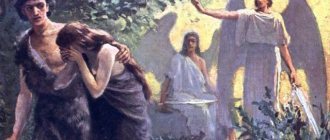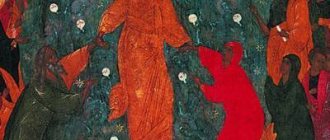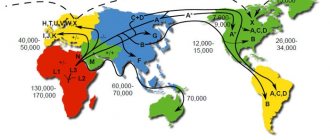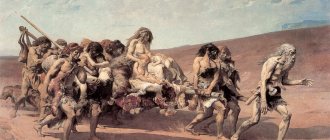History of appearance
Adam exists in Judaism, Christianity, and Islam. In the Old Testament, the creation of the first man is presented in two versions. The progenitor of the human race was born by the will of God, who created him from the dust of the earth, breathing the “breath of life” into his nostrils. Another interpretation of such a significant event is that God created Adam and Eve in his own image and likeness so that the couple would rule all life on earth.
Adam and Eve with God
The hero had to live for many years: judging by the biblical chronology, Adam saw the world in 3760 BC and lived for 930 years. The age of the first man has become a subject of debate among researchers. Some argue that in those days human existence lasted for centuries. Others are sure that age should be calculated in lunar months. Then, if 10 years are taken as one year, then Adam lived only 75 years.
In the Koran, the biblical story is repeated, but with some changes. Allah made a man from clay to appoint him as his vicegerent on earth. Information about the life expectancy of the first person in Islam is not indicated.
In the Slavic apocrypha, researchers encounter another story of the creation of the first man. God “assembles” Adam from what was at hand. A handful of earth is used to create a body, blood is formed from the sea, eyes are formed from the sun, clouds are thoughts, and wind and fire give breath and bodily warmth.
Humanity's first sin
When the first children of Prophet Adam (a.s.) - Qabil and Habil - grew up, it was time to marry them. If Habil was pleased with his wife, then Kabil was jealous of his younger brother, considering himself deprived. The situation was also aggravated by an incident that occurred during the sacrifice. The fact is that at that time people made sacrifices in a special place. After which fire should have appeared and consumed her. If this happened, then the sacrifice was considered accepted. That day Habil brought the carcass of the largest cattle. And Kabil, being stingy, brought only a plant unsuitable for food. As a result, it was discovered that Habil's sacrifice was accepted, but Kabil's was not. After which he was overcome by anger, and he decided to kill his brother.
This is how the first sin in the history of mankind occurred, and Qabil became the first inhabitant of Hell among people.
Life in Eden
Both God and Allah settled Adam in the paradise garden of Eden, surrounded by the greenery of fruit trees. The man, appointed guardian and “gardener” of the wonderful place, was allowed to eat the fruits of any plant, except one - the creator strictly forbade him to touch the fruits of the Tree of the Knowledge of Good and Evil. Adam knew that a terrible punishment awaited him in the form of death if he disobeyed his father.
Adam in the Garden of Eden
The first man enjoyed a blessed life in Eden, basked in the warm sun and did not know grief. One day, God brought the newly created animals to the man so that Adam could give them names and choose an equal helper. However, among the living creatures there was no creature similar to man. Then God took out a rib from Adam and created Eve, who from now on became his wife. The couple paraded around the Garden of Eden completely naked, but in their souls they had never known such a feeling as shame.
Adam's Disobedience in the Bible
It would seem that everything was excellent, life was filled with joy and was in full swing. Adam communicates with the Creator; Nearby, his wife Eva helps him manage the garden.
The Bible describes an event that will affect all of humanity. First, Eve, and then Adam, disobeyed the command of the Creator, which entailed the knowledge of evil (sin). Because of disobedience, man lost the glory of God, the position he had before God.
The punishment came - expulsion from the garden, as a result of which Adam could no longer walk with God and communicate with Him as before. Problems came into a person’s life: hard work, quarrels, envy, murder, hatred, pride, exaltation, all kinds of impurity, etc. - all this is a consequence of disobedience. By reading the Bible stories, one can see how sin enslaves and corrupts generation after generation, affecting humanity to this day.
Adam lived 930 years. He fulfilled God’s word to be fruitful and multiply, but, unfortunately, he was unable to correct the mistake he had made.
A loving God has found a way to bring a person back to himself. He sent the last Adam, who paid a great price.
Exile
Side by side with a couple of the first people lived a cunning serpent-tempter, who for a long time convinced Eve to try the fruit of the forbidden tree. Gad assured that death did not threaten, on the contrary, people would become equal to God and, finally, know good and evil. In the end, the woman gave in, and after her Adam ate the fruit. The magic didn’t take long to happen - the heroes suddenly felt ashamed of their nakedness and hastened to hide from their father’s gaze.
Adam, Eve and the tempting serpent
The angry God cursed the serpent, dooming it to crawl and eat dust forever. Adam and his wife were expelled from paradise. In addition to this, the characters received a scattering of unpleasant consequences: from now on, the woman is doomed to give birth in pain, and the man must work up to seven sweats every day for food.
The creator took away another bonus from children - immortality. Since then, people have been haunted by old age and inevitable death, which returns dust to the ground, from where Adam once appeared. But, sending the inhabitants of Eden into exile, God at least gave them “clothes of skin.”
Adam and Eve are expelled from Paradise
In the Islamic tradition, the role of the tempter was played by the genie Iblis. And if in Christianity a woman is accused of disobeying God, then in the Koran the blame for what she did falls on the shoulders of Adam. By the way, in Islam there is no concept of original sin, and a man’s act is his personal choice, the consequences of which do not affect descendants.
Adam's new life was filled with suffering from illness and hard work. The hero became the father of Abel, Cain and Seth. The last offspring received the honor of becoming the ancestor of modern humanity, because the offspring of the older brothers disappeared during the era of the Flood.
The universal significance of the nature of the first man
The first people, Adam and Eve, are the ancestors of all humanity. There was no other root from which the human race took its beginning, either before or after them. In Gen. 2:5 it is said that before the creation of Adam there was no man to cultivate the land, but in Gen. 3:20 the name of the wife is reported and it is explained that she was called Eve (Hebrew hawwah - life), because she became the mother of all living, that is, the foremother. The unity of the human race is evidenced by the Old Testament genealogies leading from Adam (Gen. 5, 1; 1 Chron 1), and in the New Testament in the genealogy of Jesus Christ, the Evangelist Luke indicates that Christ is not only the Son of God, but also the Son (i.e., a descendant ) Adam (Luke 3:23-38). Finally, Acts tells us that the entire human race was created “of one blood” (Acts 17:26).
The Apostle Paul calls Adam not only “the first man” (1 Cor. 15:47), but also “the image of the future” (Rom. 5:14), meaning the Son of Man, who came to “renew” fallen Adam, “the first” and “early” man (1 Cor. 15:47). The “Second” Man is Jesus Christ; at the same time He is also the “last Adam” (1 Cor. 15, 47, 45). The Apostle, contrasting the first and second Adam, points out that from the “earthly” man a Christian inherits a nature corrupted by sin, the destiny of which is inevitable death, and from the “heavenly” Man (1 Cor. 15:48) - a regenerated nature, the destiny of which is eternal life. “Like the earthy, so are the earthy; and as is the heavenly, so are the heavenly. And just as we have borne the image of earth, we will also bear the image of heaven” (1 Cor. 15:48-49). Thus, being a son of Adam by birth and reborn in Christ, the Christian is in constant connection with the first and second Adam. He is called, according to the words of the same apostle, “to put off his former way of life, the old man, which is corrupted by the deceitful lusts... and to put on the new man, created according to God, in true righteousness and holiness” (Eph. 4:22,24).
About two Adams after the apostle. Paul teaches St. Irenaeus of Lyons, noting that “in the first Adam we offended [God] by not fulfilling His commandments” and “reconciled [with Him] in the Second Adam, “being obedient even to death” [2]. In the Redemption, according to the same St. father, Christ “headed (recapitulavit) all mankind, giving us salvation, so that what we lost in Adam ... we received again in Christ Jesus” [3].
The idea of the universal human nature of the first man was reflected in the patristic and liturgical tradition of the Orthodox Church. Churches. St. Gregory of Nyssa believes that “this name “Adam”... is given to created man not as any one, but as a general race.”
[4].
Trying to understand the pan-human character of Adam’s nature, some Christian thinkers (for example, Vl. S. Solovyov, Archpriest S. Bulgakov) deviated into speculative constructions, as a result of which the first man became more than one (more precisely, the first) hypostasis with a universal human nature , but a multi-hypostatic personality, in which each person, in some incredible way, was already present in his own hypostasis. The anthropological fallacy of such ideas inevitably led to an error in the field of soteriology, to a distortion of the doctrine of original sin and the salvation accomplished by the Second Adam - Jesus Christ.
In culture
Writers and artists are famous for their love for this character and the plot as a whole, which gave several bright symbols at once, opening up a wide field for imagination. Writers and poets are happy to use Eden, the forbidden fruit, the Tree of Life, and the tempting serpent in a literal and allegorical sense.
Dante Alighieri in The Divine Comedy, the German playwright Hans Sachs in The Tragedy of the Creation of Adam and His Expulsion from Paradise, and the German poet Friedrich Klopstock, who forced the first earthly man to repent in the tragedy The Death of Adam, undertook to capture the image and interpret the fate of Adam on paper. in sins before God.
In the 16th century, the poet and playwright from the Netherlands Joost Vondel surprised the literary world with an unusual view of the Fall of Adam: in the drama “Adam in Exile,” an angel consoles the outcasts of Eden that they will now find an “inner paradise” that lurks in the depths of the soul. And, perhaps, the most famous creation belongs to the pen of John Milton - the author became famous for the poem “Paradise Lost”.
Adam and Eve on a triptych by Albrecht Durer
In Russian literature, the work “Prayer” stands out, in which the writer Daniil Zatochnik blames Eve for Adam’s plight.
Representatives of artistic and literary circles mocked the biblical story, which features Adam, to their heart's content, creating anti-religious works with a humorous touch. Jean Effel was able to indulge in blasphemy when he presented the public with a funny collection of drawings, “Adam Meets the World.” Mark Twain also chose the genre of satire to create stories under the general title “Adam’s Diaries.”
Fine art is also proud of its collection of paintings on the theme of Adam’s suffering and life in Eden. The artists mainly choose four iconographic scenes - the creation of Adam and Eve separately, the fall of the characters and the expulsion from paradise.
Fountains "Adam" and "Eve" in Peterhof
The works of the Italian painter Masaccio and the German graphic artist Albrecht Durer are considered interesting paintings. And the most famous painting was the fresco of the great Buonarroti by Michelangelo “The Creation of Adam”, which adorns the ceiling of the Sistine Chapel. The painting depicts the progenitor of the human race lying on an emerald rock, in which life is gradually awakening.
The rich sculptural heritage delights art lovers. The Adam Fountain is part of the palace and park ensemble of Peterhof. Dane Karl Bonnesen gave the world the composition “Adam and Eve Mourn the Death of Abel.” The masterpiece with biblical heroes performed by the German Johann Gottfried Schadow is also widely known.
Contemporary artists also do not stand aside. In 2013, a sculpture dedicated to Adam and Eve grew near the registry office of the city of Kramatorsk (Donetsk region). The author of the steel monument is artist Vyacheslav Gutyrya. The statue of the ancestors of mankind weighing 700 kg appeared on the eve of Family Day.
Prophet Adam
Adam (Arabic: آدم) is the first man on earth and the forefather of all humanity. In addition, Adam is the first prophet of God on earth to whom the sacred scrolls were sent down. In the Holy Quran, Adam is mentioned 25 times in different contexts (see the selection of verses in the Index of the Quran).
What is the story of the creation of Adam?
Before the Almighty created Adam, He announced this to the angels, informing them that he would be the viceroy on earth, from whom the entire human race would originate. The angels, having learned about this, were perplexed and greatly surprised. Angels, by their nature, are always submissive to the Almighty and never contradict Him, but despite this, they hastened to ask the Almighty a question about the necessity of creating man on earth, because they wanted to understand the wisdom of this. They were surprised: why is it necessary to create a person, after all, if he, like them, worships the Almighty and praises Him, then they are already fulfilling this duty, performing it tirelessly day and night? [1] On this subject in the Sacred The Koran says the following:
“They exclaimed [in bewilderment, having some information from the Preserved Tablet about what kind of character the people would be]: “[Lord, let me say] Do you want to settle there those who will begin to corrupt (corrupt, corrupt, sow discord) and shed blood? ! We magnify You with gratitude and associate only holiness with You. [If we are angels, submissive to You and sinless by nature, why do we need this sinful man?!]” (Holy Quran, 2:30).
Theological assumptions about what exactly confused the angels, prompting them to tell the Almighty about the need for the creation of man:
- They knew that the jinn, who previously inhabited the earth, shed blood on it and committed various vile acts, which is why they were expelled from there.
- They were inspired by the Almighty himself to ask a similar question so that the Divine wisdom inherent in the creation of man would become more obvious.
- They knew from the Preserved Tablet what kind of character people would be and that they would tend to shed blood on earth and commit evil on it[2].
How did the Almighty dispel the bewilderment of the angels associated with the future creation of Adam?
The Almighty dispelled their bewilderment, saying that there is a lot of wisdom in the creation of man, which they have not yet been given the opportunity to know. As you know, throughout the history of mankind, among people there have always been such righteous servants of the Almighty as prophets, messengers, martyrs for the faith and simply pious people. This fact is already sufficient in favor of the meaningless creation of Adam on earth[3]. In the Holy Qur'an, the Almighty's answer to the angels sounds like this:
“He (the Lord of the worlds) replied: “I know what you do not know” (Holy Quran, 2:30).
The reason for the high and honorable position of Adam before the Almighty in comparison with the rest of His creations
The main reason is that the Almighty taught him the names of every earthly thing, which even the angels did not know, although they are the closest and most obedient slaves of the Creator. The Holy Quran says this:
“And He taught Adam all the names [the names of everything on earth], then he showed it to the angels and asked: “Tell Me the names of this, if you are truthful [aware of everything, sure that there is no point in creating man and giving him such an important mission].” (Holy Quran, 2:31).
The above is also confirmed by a reliable saying of the Prophet Muhammad, transmitted from the words of Anas ibn Malik, which says:
“On the Day of Judgment, believers will gather and [seeing with their own eyes the horror of this Day] they will say: “How can we find someone who will intercede for us before the Lord? [To this end] they will come to [the prophet] Adam and say [to him], “You are the father of humanity. Allah (God, Lord) created you with his own hand [4] [without the participation of father and mother], ordered the angels to bow to you, and also taught you the names of all things! Intercede for us before your Lord, so that it becomes easier for us here!” [To this request] he will answer: “I do not have that level [of closeness to God].” He will mention his sin and show modesty: “Go to Noah. He is [God’s] first messenger on earth to people [and I was only a prophet].”
They will come to him, and he (Noah) will say: “I do not have that level [of closeness to God].” He will remember the question that he asked God, without having the knowledge [asking it inappropriately], will show modesty and say: “Go to the friend of the All-Merciful [Lord, to the Prophet Abraham].”
They will come to him, and he will answer: “I don’t have that level [of closeness to God].” And he will add: “Go to Moses. He is a servant of God to whom Allah (God, the Lord) [Himself] spoke and to whom he gave the Torah.”
They will go to him, and he will say: “I don’t have that level [of closeness to God].” And he will mention the lawless murder of a person [which he once committed], and will show modesty before the Lord. But he will say: “Go to Jesus, the servant of God and the messenger, who was the Word of God and His spirit[5].” [But when asked for intercession] he (Jesus) will say: “I don’t have that level [of closeness to God]. Go to Muhammad. He is a servant of God who has been forgiven all past and future sins.”
And then they will come to me [the Prophet Muhammad continues his story]. I will retire to ask the Lord for permission and receive it. Having presented myself before Him (having seen Him) [despite the fact that God is not limited by either place or time, immaterial], I will bow to the ground and remain in it until God’s will. And they will say: “Raise your head. Ask and it will be given to you. Speak and you will be heard. Intercede and your intercession will be accepted.” I'll raise my head. I will praise (thank) God with the words that He will teach me. And then I will begin to intercede [for those who asked me to do this]. I will be given a limit [on the number of people and their qualities, the degree of sin], and I will facilitate their entry into Paradise. Afterwards I will return to Him [God, the Lord of the worlds] and again, having seen Him, in a similar [previously mentioned sequence] I will intercede [but now for more sinners]. I [will be given such an opportunity, but again] a limit will be placed [on the number of people, their qualities, the degree of sin], and I will contribute to their entry into Paradise. The same thing will happen the third and fourth time. [I will help people with increasingly serious sins to receive God's forgiveness and enter Paradise.] As a result, only those who are “limited” by the Koran will remain in Hell, and they will be in Hell forever [that is, regarding them there is a direct and unambiguous Koranic text about eternal stay in Hell]”[6].
What was the reaction of the angels after the Almighty told them about the main reason for Adam's high and honorable position?
Upon learning of this, the angels immediately recognized Adam's honorable position, as evidenced by the following verses of the Holy Qur'an:
“They answered: “Holy are You, O Lord!” If we know about something, it is only about what You have given us knowledge about. Verily, only You are the All-Knowing and the Infinitely Wise. He said: “Adam! List their names!” When he announced them, He [the Lord of the worlds] continued: “Did I not tell you that I know the unknown in the heavens and the earth, I know what you do openly and what you hide?!” (Holy Quran, 2:32, 33).
About the order of the Almighty to the angels to bow to the ground before Adam, expressing tribute of respect to him
After the Almighty told the angels about the main reason for the high and honorable position of Adam, He ordered them to bow before him, thereby paying tribute to him. This further proves that Adam truly occupies a high and honorable position among all the creations of the Most High, including before the angels[7]. In the Holy Qur'an it is stated as follows:
“And We said to the angels: “Worship Adam!” [Pay tribute to him as a new, never-before-existent creation of the Lord God].” Everyone bowed down, except [the genie] Iblis (Satan), he resisted (refused) [having freedom of choice, unlike the angels], considered himself important (became proud) and became one of the atheists [who rejected the gifts of God and showed disobedience to Him]" ( Holy Koran, 2:34).
Why Iblis (Devil) refused to fulfill the command of the Almighty to bow to Adam
The main reason for this lies in the pride and arrogance of Iblis, since, being created from fire, he considered himself better than Adam, who was created only from clay. Thus, Iblis concluded that he was worthy of greater honor and respect than Adam. This is even despite the fact that the Almighty ordered all the angels, including Iblis, to recognize the honorable position of Adam over all other creations. In fact, if you think deeply, you can conclude that clay brings much more benefit and benefit to people than fire. At the same time, clay is practically harmless, which cannot be said about fire. Therefore, Iblis’s conclusions about the superiority of fire over clay are clearly erroneous[8]. In the Holy Qur'an, Iblis's refusal sounds like this:
“[The Lord of the Worlds] said: “Iblis! What prevented you from worshiping the one whom I created with my own hands [myself, according to My Divine will]?! Have you become proud and considered yourself above this?! [The Devil] replied: “I am better than him. After all, You [God] created me [initially] from fire, and him (man) - [only] from clay!” (Holy Quran, 38:75, 76).
Confirmation that Iblis was created precisely from fire is also the saying of the Prophet Muhammad, transmitted from the words of Aisha, his wife, which says: “Angels were created [by God initially] from light, jinn from the pure flame of fire [9], and Adam is from what is described to you [in the Quran][10]“[11].
What is the true essence of Iblis (Devil)
Iblis was one of the jinn who once inhabited the earth, and when they began to commit various kinds of bad deeds on it, the angels, by order of the Almighty, destroyed some of them, drove some away, and took Iblis with them to heaven. There he remained until the Almighty cursed him for refusing to bow to Adam[12].
How Iblis was granted respite until the Day of Judgment
After Iblis became proud and refused to bow to Adam, and the Almighty cursed him and expelled him, he asked the Lord for a reprieve until the Day of Judgment. His request, by the will and wisdom of the Almighty, was granted, since it corresponded to the essence of people’s existence, the main purpose of which is testing and testing their strength. Having received approval for his request, Iblis swore to the Almighty that he would seduce people and lead them astray from the true path, except for the most sincere and devoted. To this, the Almighty replied that those of them who follow him will face the eternal torment of Hell[13]. The Holy Quran says this:
“[Having earned God's curse with his misplaced assumptions of superiority and display of pride, Satan] asked: “Lord, grant me a reprieve [the opportunity to live freely and not die] until the Day of Resurrection [of humans and jinn]. [He] was answered: “Verily, such an opportunity has been given to you until a certain Day [before the End of the World]. [The devil, having received a reprieve] exclaimed: “I swear by Your greatness! I will deceive them every single one (I will mislead them all) [quarrel over petty and worthless issues; emotionally arouse to destroy their goals and objectives; put into a state of confusion, loss; I will deprive them of the meaning of life], (I will seduce, seduce, tempt) [by hook or by crook I will lead along the path of sin and crimes, frivolity and carelessness]. Except for those who will be sincere before You (whom You will bless with sincerity) [Lord, You will help him so that he may be and remain firm in the faith; who will not yield to my admonitions]. Said [the Lord of the worlds: “This is] the truth [so it will be]! And I say the truth: I will certainly fill Hell with you [Satan] and those who follow you, with all of you” (Holy Quran, 38:79-85).
About the creation of Eve (Hava), the wife of Adam
The Almighty created the human essence, like the essence of many other living beings, in need of a pair similar to itself. Therefore, the Almighty did not leave Adam to remain alone in the heavenly abode, but created a couple for him, which was a woman, who, according to legend, was called Eve (Hava). One of the main purposes of the creation of Eve by the Almighty was so that Adam would find solace in her and, thanks to her, would not be left alone. According to the verses of the Holy Quran and some sayings of the Prophet Muhammad, she was created from the flesh of Adam[14]. For example, one of the verses on this subject says:
“O people, fear your Lord [by doing what He prescribed and avoiding what is clearly forbidden, but at the same time being able to live fully, brightly], Who created you from one soul [from one beginning] and from it a mate [the human race went, according to the will of the Almighty , starting with the creation of Adam and Eve]. And from them (Adam and Eve) He scattered [across the earth] many men and women” (Holy Quran, 4:1).
Regarding the creation of Eve, the following sayings of the Prophet Muhammad are cited: “Truly, a woman is like a rib[15]! If you want to straighten it out, you will break it[16], but leaving it as it is, you can enjoy family life, taking into account its crookedness”[17]; “Treat women well (make that commitment as a covenant)! Indeed, truly, women are created [figuratively speaking] from a rib[18]. And the greatest curvature of the rib is in its upper part[19]! If you want to straighten it out, you will break it. If you don't touch it, it will remain as it is. Treat women well!”[20].
While in Paradise, Adam and Eve were allowed to enjoy the benefits of this monastery without restrictions and eat any fruits there, with the exception of the fruits of the forbidden tree. However, Iblis, using his cunning, persuaded Adam and Eve to taste the fruits of the forbidden tree, after which they were expelled from the heavenly abode and lowered to earth[21]. The Holy Quran says this:
“We told Adam: “Live with your wife in Paradise, eat the blessings of heaven without restrictions, wherever you want [everything is edible, tasty, easily accessible for you], but do not approach this tree [do not touch it], otherwise you will become sinners. Satan [whispering] made them stumble (make a mistake) regarding that [forbidden fruit] and brought them out of the state and place in which they were. We [speaks the Lord of the worlds, pointing to His greatness] said: “Get down [to the earth and remember that] you are enemies to each other. [Satan, the Devil is the enemy of man forever.] The earth for you is a place of temporary residence, where you will find everything you need for your life” (Holy Koran, 2:35, 36).
How Iblis tricked Adam and Eve and persuaded them to eat the fruit of the forbidden tree
Iblis whispered to them that if they tasted the fruits of the forbidden tree, they would remain forever in the heavenly abode and enjoy it[22]. The Holy Quran says this:
“[The devil was full of desire to take revenge, inviting further troubles upon himself, but also thereby participating in the deep plan of God.] In a whisper (at the level of the soul) he said to Adam: “Listen, if you want, I will show you the tree of eternity and power, which is not will come to an end (you will become infinitely rich) [only by eating the fruit from it]? (Holy Quran, 20:120).
Theological assumptions about what kind of Paradise Adam and Eve were in before they were expelled from there
- According to the majority of theologians, this was the same Paradise that believers will enter. They made this assumption based on the fact that the verse does not contain any clarification, but there is a general reference to Paradise, and when speaking about Paradise, as a rule, it means Paradise in the eternal abode.
- According to others, it was a kind of temporary Paradise on earth, created specifically for Adam and Eve. Because, in their opinion, there was a restriction in this Paradise associated with the forbidden tree, and also because Iblis had the opportunity to enter it[23].
About the repentance of Adam and Eve for complete disobedience before the Almighty
After Adam and Eve realized the seriousness of their disobedience, they immediately hastened to repent before the Almighty. Having admitted their mistake and wanting to return back to submission before Him, they prayed to Him for forgiveness and mercy. The Holy Quran says this:
“They [Adam and Eve] prayed: “Lord, we have sinned!” If You do not forgive us and have mercy, then we, lost, will perish” (Holy Koran, 7:23).
It is important to note here that, according to some theological assumptions, Adam and Eve received the above prayer for forgiveness from the Almighty Himself, since they could not have known about such a prayer on their own[24]. This is how, according to theologians, the following verse should be understood:
“Adam received words from the Lord [prayers, begged for forgiveness along with Eve] and was forgiven [and both were forgiven]. Verily, He is All-Forgiving and All-Merciful” (Holy Quran, 2:37).
The above is also confirmed by another verse which says:
“Then [after Adam realized his wrongdoing and repented along with Eve] the Lord chose him [brought him closer], forgave him [like her] and set him on the right path [again, strengthening the prophet in infallibility]” (Holy Quran, 20 :122).
About how Adam and Eve were lowered from the heavenly abode to earth
After Adam and Eve disobeyed their Lord, they were brought down from heaven to earth. There they found themselves in completely different conditions in which they now had to live. The Holy Quran says this about this:
“[The Lord forgave them and] said: “Go down [to earth, from now on] you are enemies to each other. [Satan, the Devil is the enemy of man forever.] The earth for you is a place of temporary residence, where there will be everything necessary for your life” (Holy Koran, 7:24).
The expulsion of Adam and Eve is also mentioned in some of the sayings of the Prophet Muhammad. So, for example, in one of his sayings, transmitted from the words of Abu Hurayrah, it is reported: “The best day on which the sun rises is Friday. On this day [the progenitor of mankind, the prophet] Adam was created. On this [same] day [of week] he was introduced into Paradise. And on that [same] day he was taken out of it. The hour [of the general Resurrection from the dead after the End of the World] will come precisely on Friday.”[25]
About the dispute that took place between the prophet Musa and Adam
“[Once upon a time in timeless space] Musa (Moses) argued with Adam. Musa said: “You are the one who, by your sin, brought people [all humanity] out of Paradise and [thereby] made him miserable.” To this Adam replied: “Musa (Moses)! You are the one whom Allah (God, Lord) chose [from all the people of your era], making him His prophet, and with whom you spoke directly [without the mediation of an angel]! How can you reproach me for what was determined for me by God [even] before my creation?” The Prophet Muhammad then continued by saying: “Thus Adam prevailed in the dispute with Musa (Moses).”[26] There are things that cannot be avoided, but you are only responsible for your own choices[27]. And if he turned out to be unfaithful or even sinful, while you are alive, you can repent before God and correct everything[28]. Don’t make excuses before people, but repent and fundamentally, gradually transform yourself before the Creator!
The story of the two sons of Adam
There is a verse in the Holy Quran that talks about the two sons of Adam. One of them was called Qabil (Cain), and the other Habil (Abel). The sons of Adam made a donation in the name of the Almighty, but Habil accepted it, but Kabil did not. This, according to the verse, caused Qabil great anger and envy, which caused him to commit a sin. Thus, he became the first person on earth to commit a crime[29].
The Holy Quran says this:
“Tell [O Muhammad] to them [the people] the story of the two sons of [the forefather of mankind] Adam with the truth [a message from God that is truthful and edifying]. They [Kabil and Habil (Cain and Abel)] brought a donation [in the name of God: Habil (Abel) brought the best ram from his flock, and Kabil (Cain) brought a few ears of wheat from his field, but brought something worse]. From one [from Habil (Abel)] the donation was accepted, but from the other - not. [Kabil (Cain) was indignant, and envy of his brother awoke in him. Then he waited for the right moment, when their father Adam had left, and] exclaimed [to Habil (Abel)]: “I will kill you!” He replied: “Allah (God, Lord) accepts only from the pious (Holy Quran, 5:27).
A more detailed theological speculation about what exactly made Qabil commit the murder of his brother
The most common version is the following. The first couple, Adam and Eve, gave birth to twins of different sexes - a boy and a girl, who, according to the instructions of the Almighty, married those who were born after them - again twins, a boy and a girl. When the time came to marry Kabil and Habil, Adam was going to do just that, but Kabil refused to follow this order of the Almighty and did not want to marry Habil’s twin sister, but wanted to marry only his twin sister, since she was much more beautiful and attractive . All of Adam's attempts to dissuade Kabil were unsuccessful. Therefore, Adam proposed to resolve the dispute through sacrifice. The sons agreed to this proposal, and Kabil sacrificed only a small number of ears of wheat, and Habil sacrificed one of the best rams from his flock. Their sacrifice ended with Habil accepting it, but Qabil not. This infuriated Kabil even more, causing him to say: “I will kill you, Kabil, and will not let you marry my sister!”[30].
Habil's reaction to Kabil's threat to kill him
Habil was a well-behaved and God-fearing man. He understood well that by responding with evil for evil, the situation would only worsen. The Holy Quran says this:
“[I swear] if you stretch out your hand to kill me, I will not stretch out mine to kill you. Verily, I fear Allah (God), the Lord of the worlds. [If you kill me, then] you will return [to God] with mine and with your sin [with the sin of killing me and all your previous sins], and in the end you will become one of the inhabitants of Hell. This [hellish abode] is the fate of tyrants [oppressors, obvious villains and sinners]" (Holy Quran, 5:28, 29).
Habil’s decisive refusal to respond in a similar way to Qabil’s threat, as given in the above verse, according to theological scholars, can also be explained by the fact that he well understood that responding like this would result in a heavy responsibility before the Almighty on the Day of Judgment. This is confirmed by the saying of the Prophet Muhammad, which says: “If two Muslims meet with swords (turn weapons against each other), then both of them [after the End of the World and the Day of Judgment] will end up in Hell.” The companions clarified: “It’s clear with the murderer, but what about the one who was killed?!” “Truly, he [also] wanted to kill another [he just couldn’t do it],” answered the Messenger of God[31].
About how the raven showed Kabil what to do with the corpse
Having killed Kabil, Kabil did not know what to do with his body. This continued until, by the will of the Almighty, two ravens fought before his eyes. During this fight, one of them gained the upper hand over the other, killing him. After this, the raven, which had gained the upper hand, began to dig a hole in the ground, into which it pushed the killed raven, and thus performed a kind of burial. Seeing this, Kabil realized that he should do the same with the body of his murdered brother[32]. The Holy Quran says:
“The soul prompted (forced) [having given courage] his [Qabil (Cain)] to kill his [brother], and he killed him, and the next morning he became lost everything [worldly peace and satisfaction, as well as eternal well-being. He was confused, not knowing what to do with the lifeless body].
Allah (God, Lord) sent a raven, who began to dig in the ground [to dig out a grave for his dead fellow raven with his beak and claws], in order to show him [Qabil (Cain)] how to bury (hide) his brother’s body.
[Kabil (Cain), seeing the raven] exclaimed: “Oh woe is me, can’t I be like this raven [couldn’t have thought of this before] and bury (hide) my brother’s body?!” The next morning he became sad [like any other sinner: today he commits a sin without thinking about the consequences, and the next day he regrets what he did. But Kabil (Cain) was more saddened not by the act (after all, he did not repent of what he had done), but by the lack of a feeling of satisfaction from what he had done and the fact that he had to carry his brother’s body on himself for a very long time, not knowing what to do with it, until he met a crow on the way]” (Holy Koran, 5:30, 31).
It is important to note that the sinfulness of Qabil’s act in killing his own brother is so great that the sin for such an act is recorded for him to this day. This is confirmed by the saying of the Prophet Muhammad: “The sin of the lawless killing of a person falls not only on the killer himself [to a “volume” similar to if he had killed all of humanity], but also on the one who was the founder of this [terrible] crime - one of the two sons of the progenitor Adam. After all, it was he who introduced this sunnah into practice (paved the way for this atrocity)[33]“[34].
According to various legends, Adam lived a long life, leaving behind a large number of descendants. It is said that during his lifetime he found many of his grandchildren and great-grandchildren, as well as their children. Among his sons were those to whom he passed on his prophetic knowledge. They, in turn, became the successors of his prophetic mission on earth[35].
Subscribe to our Instagram page
Links to theological primary sources and commentary:
[1] Ibn Kasir I. Qasas al-anbiya' [Traditions of the Prophets], 3rd ed. Mecca: Maktaba al-Talib al-Jami'y, 1988. P. 22.
[2] Ibn Kasir I. Qasas al-anbiya' [Traditions of the Prophets], 3rd ed. Mecca: Maktaba al-Talib al-Jami'y, 1988. P. 22.
[3] Ibid. pp. 22, 23.
[4] “[The Lord of the Worlds] said: “Iblis! What prevented you from worshiping the one whom I created with my own hands [myself, according to My Divine will]?! Have you become proud and considered yourself above this?!” [The Devil] replied: “I am better than him. After all, You [God] created me [initially] from fire, and him (man) - [only] from clay!” (Holy Quran, 38:75, 76).
[5] “There is no doubt that the Messiah, 'Isa (Jesus), son of Maryam (Mary), is the Messenger of Allah (messenger of God) and His Word sent down to Maryam (Mary), the Spirit from Him [the Lord of the Worlds]" ( see Holy Quran, 4:171); “And [remember Mary], who retained her chastity (virginity). We breathed into her our Spirit [the angel Gabriel (Gabriel)] and made her, as well as her son, a sign for all the worlds [after all, Jesus became the only one in the entire history of mankind who was born without a father, and in whatever form - neither human nor Divine]” (Holy Quran, 21:91).
[6] See: al-Bukhari M. Sahih al-Bukhari [Code of hadiths of Imam al-Bukhari]. In 5 volumes. Beirut: al-Maktaba al-'asriya, 1997. Vol. 3. P. 1350, hadith No. 4476; al-'Askalani A. Fath al-bari bi sharh sahih al-Bukhari [Revelation by the Creator (for a person to understand something new) through comments on the set of hadiths of al-Bukhari]. In 18 volumes. Beirut: al-Kutub al-'ilmiya, 2000. Vol. 10. P. 202, hadith No. 4476.
Also see: al-Bukhari M. Sahih al-bukhari. In 5 vols. T. 4. P. 2053, hadith No. 6565; al-'Askalani A. Fath al-bari bi sharh sahih al-bukhari. 2000. T. 14. P. 509, hadith No. 6565 and an explanation to it.
[7] Ibid. P. 24.
[8] Ibn Kasir I. Qasas al-anbiya' [Traditions of the Prophets], 3rd ed. Mecca: Maktaba al-Talib al-Jami'y, 1988. P. 25.
[9] “And he created [miraculously] the jinn [the ancestors of the jinn world] from a pure flame of fire [high temperature, without smoke]” (Holy Quran, 55:15).
[10] “We created man [the forefather of humanity Adam] from clay, even (smooth) mud [transforming earthen clay]” (Holy Quran, 15:26); “He [the Lord of the worlds, miraculously] created man [the ancestors of mankind] from potter’s (white) clay, like pottery (clay)” (Holy Quran, 55:14).
[11] See: an-Naisaburi M. Sahih Muslim [Code of Hadiths of Imam Muslim]. Riyadh: al-Afkar ad-Dawliyya, 1998. P. 1199, Hadith No. 60–(2996).
[12] Ibn Kasir I. Qasas al-anbiya' [Traditions of the Prophets], 3rd ed. Mecca: Maktaba al-Talib al-Jami'y, 1988. P. 26.
[13] Ibn Kasir I. Qasas al-anbiya' [Traditions of the Prophets], 3rd ed. Mecca: Maktaba al-Talib al-Jami'y, 1988. pp. 26, 27.
[14] Ibid. P. 29.
[15] Men also have a certain natural “curvature” of character, since Adam and Eve were created by the Lord of the worlds from the same quintessence. See, for example: al-'Askalani A. Fath al-bari bi sharh sahih al-bukhari. In 18 vol., 2000. T. 11. P. 315.
The Holy Qur'an says: “O people, fear your Lord [by doing what He has prescribed and avoiding what is clearly forbidden, but at the same time knowing how to live fully, brightly], Who created you from one soul [from one beginning] and from it a mate [the human race went according to the will of the Creator, starting with the creation of Adam and Eve]. And from them (Adam and Eve) He scattered [across the earth] a large number of men and women” (see Holy Quran, 4:1).
“He is the One who created you from one soul [from one quintessence] and created a mate from it [that is, humanity began, according to the will of the Lord, with the creation of Adam and Eve], so that they would be calmer together (more comfortable, so that they would have someone to to feel sympathy, to feel attraction; to love; to share intimate things, to find consolation, to share joy)” (see Holy Quran, 7:189).
[16] One of the reliable hadiths explains: “If you start [stubbornly] straightening it, you will break it. Breaking her is divorcing her.” See: an-Naysaburi M. Sahih Muslim. P. 585, Hadith No. 59–(1468); an-Nawawi Ya. Sahih Muslim bi Sharh an-Nawawi. In 10 volumes, 18 hours, volume 5, part 10, p. 57, hadith No. 59–(1468); as-Suyuty J. Al-jami' as-saghir. P. 129, Hadith No. 2111, “sahih”.
[17] Hadith from Abu Hurayrah; St. X. Muslim, at-Tirmidhi and others. See: an-Naysaburi M. Sahih Muslim. P. 585, Hadith No. 65–(1468); an-Nawawi Ya. Sahih Muslim bi Sharh an-Nawawi. T. 5. Part 10. P. 56, Hadith No. 65–(1468); at-Tirmidhi M. Sunan at-Tirmidhi. 2002. P. 370, hadith No. 1191, “hasan sahih”; al-Shavkyani M. Neil al-avtar. In 8 vols. T. 6. P. 216, Hadith No. 2799.
Also see: an-Nawawi Ya. Sahih Muslim bi Sharh an-Nawawi. T. 5. Part 10. P. 57, hadiths No. 59–(1468) and No. 60–(1468); al-Qurtubi A. Talkhys sahih al-imam Muslim. T. 1. P. 668, 669; al-'Askalani A. Fath al-bari bi sharh sahih al-bukhari. In 18 volumes, 2000. T. 11. P. 314, hadith No. 5186; as-Suyuty J. Al-jami' as-saghir. P. 129, hadiths No. 2111 and 2112, both “sahih”.
[18] Precisely figuratively speaking, and not actually. See, for example: Nuzha al-muttakyn. Sharh Riyadh al-Salihin [Walk of the Righteous. Commentary on the book “Gardens of the Well-Behaved”]. In 2 volumes. Beirut: ar-Risala, 2000. T. 1. P. 232, explanation of hadith No. 1/275.
[19] In the comments to the hadith, it is argued that her language is implied here (gossip, slander, lies, etc.). See: al-'Askalani A. Fath al-bari bi sharh sahih al-bukhari. In 18 volumes, 2000. T. 8. P. 454, explanation of hadith No. 3331.
Although I note that in the age of the Internet and social networks, men are not much different from women in this regard.
[20] See: al-Bukhari M. Sahih al-Bukhari [Code of hadiths of Imam al-Bukhari]. In 5 volumes. Beirut: al-Maktaba al-'asriya, 1997. Vol. 3. P. 1667, hadith No. 5186.
Also see: al-Bukhari M. Sahih al-bukhari. In 5 vols. T. 2. P. 1024, Hadith No. 3331.
[21] Ibn Kasir I. Qasas al-anbiya' [Traditions of the Prophets], 3rd ed. Mecca: Maktaba al-Talib al-Jami'y, 1988. pp. 29, 30.
[22] Ibid. P. 35.
[23] Ibid. pp. 30, 31.
[24] Ibid. P. 42.
[25] See: an-Naysaburi M. Sahih Muslim [Code of Hadiths of Imam Muslim]. Riyadh: al-Afkar ad-Dawliyya, 1998. P. 331, Hadith No. 18–(854).
[26] See: al-Bukhari M. Sahih al-Bukhari [Code of hadiths of Imam al-Bukhari]. In 5 volumes. Beirut: al-Maktaba al-'asriya, 1997. T. 3. P. 1476, No. 4738; al-'Askalani A. Fath al-bari bi sharh sahih al-bukhari. 2000. T. 14. P. 624, explanation to hadith No. 6614.
Also see: al-Bukhari M. Sahih al-bukhari. T. 4. P. 2068, No. 6614; an-Naysaburi M. Sahih Muslim. P. 1063, Hadith No. 2652.
[27] “[Under the influence of the Devil’s sweet and convincing-sounding speeches, Adam forgot the Creator’s instructions for some time.] They both [Adam and Eve] tasted [the forbidden fruit], and suddenly [unexpectedly and surprisingly] their shameful places were exposed [they became absolutely naked], after which they [shamefully] began to cover their nakedness with heavenly leaves. [Even if out of forgetfulness, but] Adam showed disobedience to God and [for a short period] went astray [at the whispering of his obvious enemy and hater]” (Holy Quran, 20:121).
[28] “Then [after Adam realized his transgression and repented along with Eve] the Lord chose him [brought him closer], forgave him [like her] and set him on the right path [again, strengthening the prophet in infallibility]” (St. Koran, 20:122); “Adam received words from the Lord [prayers, begged for forgiveness along with Eve] and was forgiven [and both were forgiven]. Verily, He is All-Forgiving and All-Merciful” (Holy Quran, 2:37).
[29] Ibn Kasir I. Qasas al-anbiya' [Traditions of the Prophets], 3rd ed. Mecca: Maktaba al-Talib al-Jami'y, 1988. P. 66.
[30] Ibn Kasir I. Qasas al-anbiya' [Traditions of the Prophets], 3rd ed. Mecca: Maktaba al-Talib al-Jami'y, 1988. pp. 66, 67.
[31] See, for example: al-Bukhari M. Sahih al-Bukhari [Code of Hadiths of Imam al-Bukhari]. In 5 volumes. Beirut: al-Maktaba al-'asriya, 1997. T. 4. P. 2215, hadith No. 7083; al-'Askalani A. Fath al-bari bi sharh sahih al-Bukhari [Revelation by the Creator (for a person to understand something new) through comments on the set of hadiths of al-Bukhari]. In 18 volumes. Beirut: al-Kutub al-'ilmiya, 2000. T. 16. P. 39, hadith No. 7083 and an explanation to it.
[32] Ibn Kasir I. Qasas al-anbiya' [Traditions of the Prophets], 3rd ed. Mecca: Maktaba al-Talib al-Jami'y, 1988. pp. 69, 70.
[33] In the Koran it is described as follows: “They [Kabil and Habil (Cain and Abel)] brought a donation [in the name of God: Habil (Abel) - the best ram from their flock, and Kabil (Cain) - some ears of wheat from their fields, but brought something worse]. From one [from Habil (Abel)] the donation was accepted, but from the other - not. [Kabil (Cain) was indignant, and envy of his brother awoke in him. Then he waited for the right moment, when their father Adam had left, and] exclaimed [to Habil (Abel)]: “I will kill you!” He replied: “Allah (God, Lord) accepts only from the pious.
[I swear] if you stretch out your hand to kill me, I will not stretch out mine to kill you. Verily, I fear Allah (God), the Lord of the worlds. [If you kill me, then] you will return [to God] with mine and with your sin [with the sin of killing me and all your previous sins], and in the end you will become one of the inhabitants of Hell. This [hellish abode] is the fate of tyrants [oppressors, obvious villains and sinners].”
The soul of him [Kabil (Cain)] prompted (forced) [having given courage] to kill his [brother], and he killed him, and the next morning he lost everything [worldly peace and satisfaction, as well as eternal well-being. He was confused, not knowing what to do with the lifeless body].
Allah (God, Lord) sent a raven, who began to dig in the ground [to dig out a grave for his dead fellow raven with his beak and claws], in order to show him [Qabil (Cain)] how to bury (hide) his brother’s body.
[Kabil (Cain), seeing the raven] exclaimed: “Oh woe is me, can’t I be like this raven [couldn’t have thought of this before] and bury (hide) my brother’s body?!” The next morning he became sad [like any other sinner: today he commits a sin without thinking about the consequences, and the next day he regrets what he did. But Kabil (Cain) was more saddened not by the act (after all, he did not repent of what he had done), but by the lack of a feeling of satisfaction from what he had done and the fact that he had to carry his brother’s body on himself for a very long time, not knowing what to do with it, until a crow met him on the way]” (see Holy Quran, 5:27–31).
[34] See: al-Bukhari M. Sahih al-Bukhari [Collection of hadiths of Imam al-Bukhari]. In 5 volumes. Beirut: al-Maktaba al-'asriya, 1997. Vol. 4. P. 2286, hadith No. 7321; al-'Askalani A. Fath al-bari bi sharh sahih al-bukhari. T. 8. pp. 448 and 455, hadith No. 3335; T. 15. pp. 234 and 238, hadith No. 6867; al-Qaradawi Y. Al-muntaka min kitab “at-targyb wat-tarhib” lil-munziri. T. 1. P. 109, Hadith No. 42.
[35] Ibn Kasir I. Qasas al-anbiya' [Traditions of the Prophets], 3rd ed. Mecca: Maktaba al-Talib al-Jami'y, 1988. pp. 78, 79.
Film adaptations
Adam also fell into the circle of interests of the film industry. The character has a couple of sensational film adaptations to his credit:
"The Bible" (1966)
Director John Huston borrowed stories from the Book of Genesis for the film. The basis is taken from the events of the life of the first people on Earth, milestones in the fate of Abraham and stories about Noah’s Ark.
The film includes “short films” about Sodom and Gomorrah and the Tower of Babel. Adam is played by Michael Parks, and his offspring are Richard Harris (Cain) and Franco Nero (Abel).
"Noah" (2014)
The epic film, created by Darren Aronofsky and starring Russell Crowe (the actor plays Noah), tells the story of an important event for the planet - the Great Flood. There was also a place in the picture for Adam, in whose image Adam M. Griffith was reincarnated.
Adam M. Griffith as Adam
The film caused anger among the Islamic community for its untruthful presentation of religious teachings, so it was banned in Malaysia, Indonesia, Pakistan and even China. But in Russia, the production caused audience delight - during the first weekend, moviegoers paid 600 million rubles to watch it on the big screen.
Death of Adam (a.s.)
Prophet Adam (a.s.) lived on earth for 960 years, although initially he was given a millennium. The fact is that one day Allah showed him all his descendants, of whom he paid attention to one - Prophet Daoud (a.s.). Adam (a.s.) asked the Lord to give his 40 years of life to him.
When Adam (a.s.) turned 960 years old, Azrael (the angel of death - note Islam.Global) appeared to him. But the prophet said in surprise that he was destined to live 1000 years. To which Azrael reminded Adam (a.s.) about the 40 years that he handed over to Daud (a.s.). Initially he denied it, but then he admitted and accepted death. Talking about this incident, the Prophet Muhammad (s.a.w.) said: “Adam was mistaken, and therefore his sons are also mistaken” (Tirmidhi).
In addition, the Arabic word "Insan" ("person") is the same root as the word "forget". It is forgetfulness that is one of the essences of people, to which the first man was subject.
It is the story of the Prophet Adam (a.s.) that should become a kind of symbol of a person’s responsibility for every action committed. His example should serve as a lesson for every Muslim who strives for the pleasure of Allah. We must make every effort not to fall into sin. If we get stuck in it, then we should ask Allah for forgiveness and refuse to follow the path of Satan.
Interesting Facts
- Various teachings present their own versions of the creation of Adam. Some are very curious, for example, in the Mandaean religion, the lifeless body of a person first appeared and only then the soul was brought from the world of Light. In the Gnostic view, Adam the androgyne was divided into two halves - male and female.
- In Islam, Adam is not just the first man. The man leads the galaxy of prophets of Allah.
- There are legends about the origin of the name. Thus, it is believed that the word Adam is an abbreviation for the four cardinal directions. It turns out that the man is a real cosmopolitan.
- According to legend, Adam's body was buried on Mount Golgotha, where Jesus was later crucified.
Studies have given different results
One famous 2013 study found that Y chromosome Adam lived between 120,000 and 156,000 years ago, and mitochondrial Eve between 99,000 and 148,000 years ago.
You can also have sweets: a nutritionist said that it’s not harmful to eat sweets in the morning
Never knock down the ice: how to save trees from return frosts
Purple hair is the dream of mysterious beauties: a selection of spectacular images
Other studies have moved mitochondrial Eve back 200,000 years, so estimates vary widely. An initial study by Allan Wilson's team at the University of California, Berkeley in 1987 on the eve of Mitochondria gave a range of 140,000 to 200,000 years.










